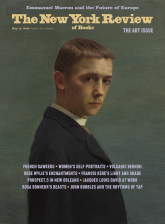In response to:
The Act of Persuasion from the April 21, 2022 issue
To the Editors:
I am writing to respond to Merve Emre’s review of my biography of Elizabeth Hardwick [“The Act of Persuasion,” NYR, April 21]. I am a journalist-turned-biographer; A Splendid Intelligence is my fourth book in that genre. Writing a biography, as opposed to a work of literary criticism, always involves a certain degree of humility: one is in service to the facts and the chronology—especially so when, as in this case, there is no previous Life.
My concern was not to address the coterie enthralled by Hardwick’s style, but rather to introduce her and her work to a much broader readership. She did not only write about literature, after all, even though literary critics generally overlook her observations about other topics. (Oddly, Emre doesn’t perceive Hardwick’s keen eye-level reporting, hardly a matter only of highflown “ideas and symbols.”) I do mention aspects of her inimitable style—there were never any imitators or followers—but I am more concerned with the substance of what she wrote, because that is what will gain her the wider readership she deserves.
Throughout the book I incorporated brief excerpts from her writing—personal letters as well as published material—to acquaint the reader with her innermost thoughts at difficult times, as well as with the range of her interests and opinions. It is a truism that authors draw on their life in their work; I would have been remiss not to indicate many of the parallels.
It amused me to quote examples of her scorn for biography, even though she wrote a marvelous, idiosyncratic life of Herman Melville. Biographies necessarily reveal the ways even the most brilliant and accomplished subjects embody the contradictions and confusions of the rest of humanity. This can be disconcerting to worshipers at the shrine.
It should be clear from the context that the “glamour, fantasy, and illicit pleasure” I mention in describing downtown Lexington, Kentucky, of the 1930s (not “fin-de-siècle,” as Emre has it) was the view held by residents at the time, including a youthful Hardwick.
Finally, Hardwick was married to Robert Lowell for one third of her long life. It would be impossible to write a comprehensive biography that did not deal with the fraught circumstances of that marriage. Relegating it to footnotes, as Emre suggests (perhaps not quite seriously), would represent a grievous injustice to her, and to biography.
Cathy Curtis
Los Angeles, California



